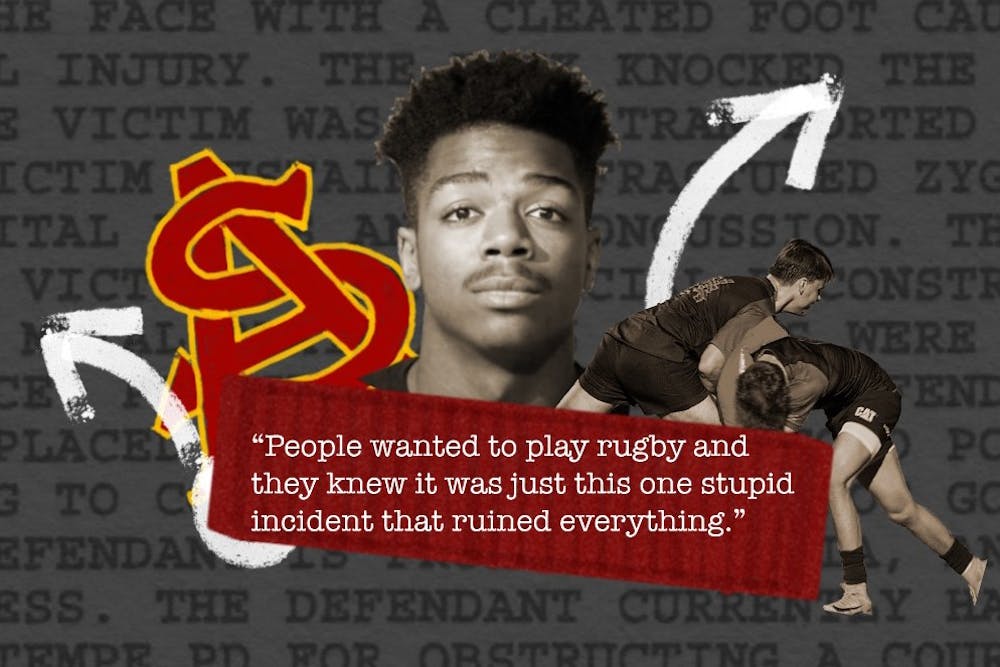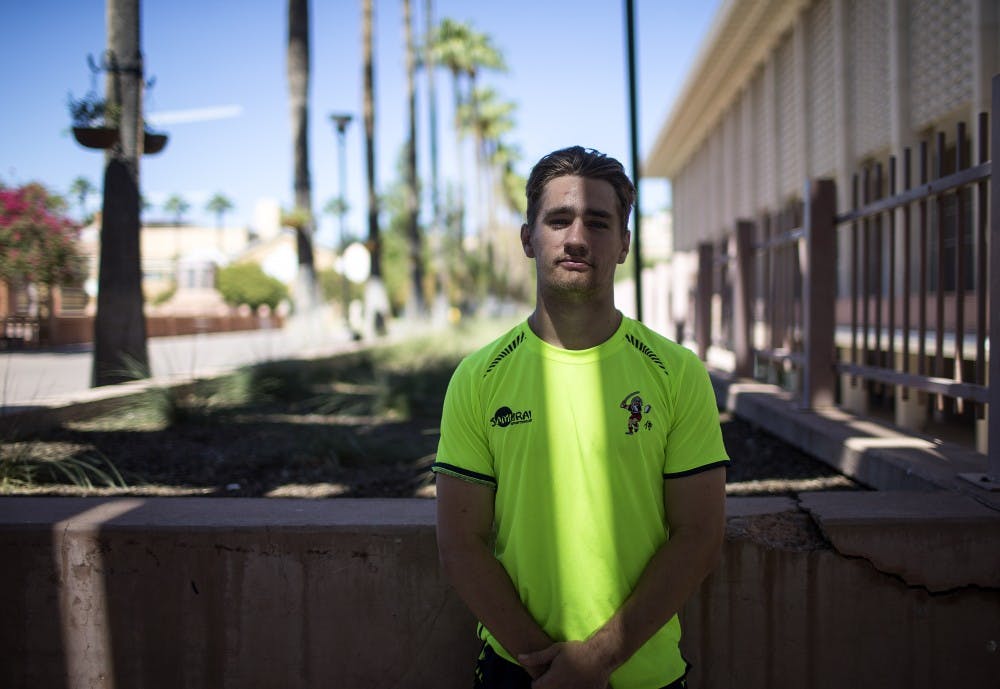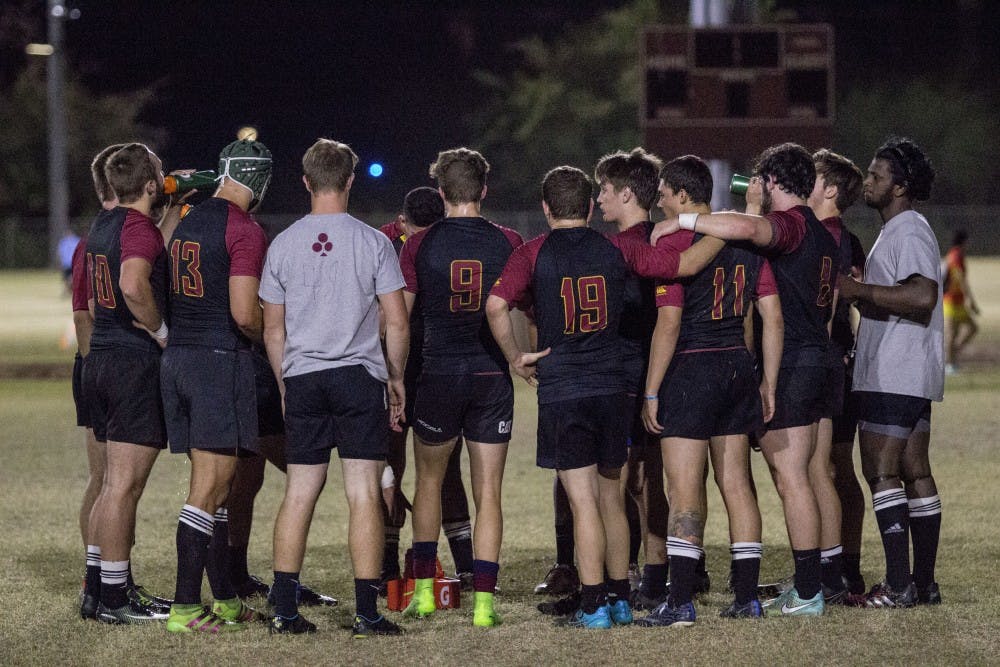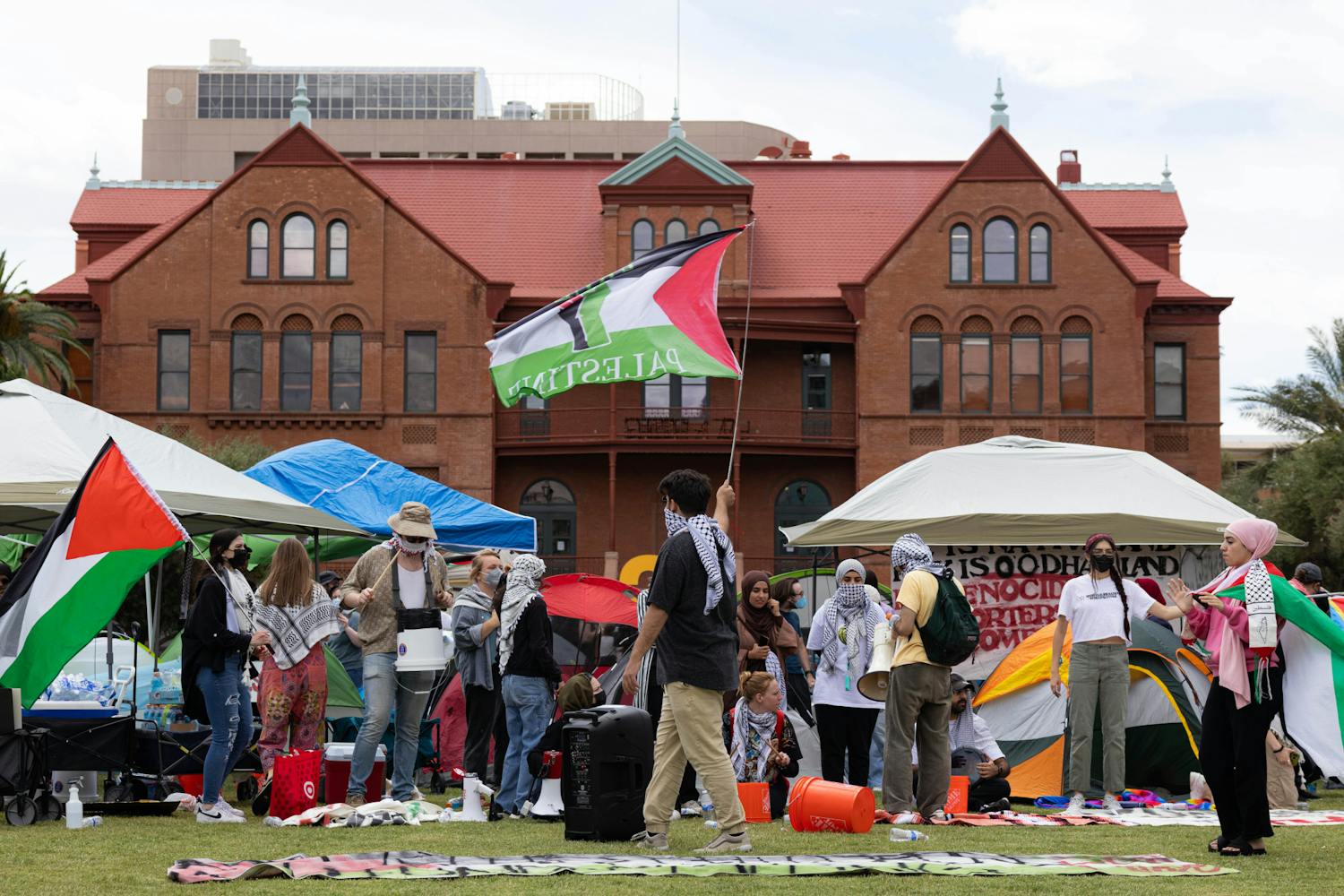During a game on Feb. 25, ASU rugby player Christopher Crawford made his way over to a UA opponent who was tying his shoe and kicked him in the face with his cleat.
The kick knocked the UA player, Doug Neary, unconscious.
It fractured bones in his face and concussed him.
Neary was transported to the hospital for facial reconstruction, where doctors inserted a metal plate and six screws into his face.
Meanwhile, Crawford ran off the field and changed into street clothes. He was later taken into custody and booked on suspicion of aggravated assault, according to court documents.
Crawford was not available for an interview in time for publication, but at the time of his arrest, he told police that the kick was in “self-defense” because Neary punched him during a tackle earlier in the game, according to court documents.
Neary and UA head coach Sean Duffy declined to comment due to the pending trial. Neary’s attorney, John Shorb of Manolio & Firestone, said he has no comment on the case.
Crawford was kicked off the team following the incident and is now on trial for aggravated assault in Maricopa County Superior Court.
The incident had lasting impacts on the team and ASU club sports as a whole. In the eight months since the assault, USA Rugby brought sanctions against the team, and ASU fired its coaches. The assault also led the University to change who is allowed to play and how coaches are hired.
A system of changes
The rugby team is under the category of a “sport club” at ASU. Unlike football or baseball, which are full-fledged Division I sports and are overseen by the athletics department, teams like rugby or lacrosse are overseen by Educational Outreach and Student Services.
Several rules governing how those sport clubs operate were changed following the assault, according to Tara Yesenski, assistant director for campus recreation at ASU.
At the time of the incident in February, Crawford was not a student at ASU – he had last been enrolled in Fall 2014. But the sport club rules at the time allowed non-students to join ASU teams.
That changed starting this school year.
“That rule was implemented this year as well because of the situation with rugby," Yesenski said. "... We felt that we really needed to protect our students and have our programs just for ASU students. That's why we changed that – just to make sure that our liability and risk is solely on our ASU students."
Yesenski said there are other places where non-students can play in the community.
“There are lots of other opportunities in the community for non-ASU students to participate in clubs that are like our sports clubs, and so we have found that it is very valuable for us to only have ASU students,” Yesenski said.
But newly added programs like the ASU Quidditch team have had difficulties with this rule. Junior co-captain Kasandra Rascon, a biological sciences junior, said at least two players this year have had to make sacrifices to play.
“A lot of times if we had players that would graduate a semester early, they would be able to continue playing for us and finish the season even though they’re no longer students,” Rascon said.
Rascon explained that the two players that were on her roster who had planned on graduating early instead had to rearrange their entire schedules to stay on the team.
“They made that sacrifice of spending more money because they love the sport,” Rascon said. “For the most part, we just figured out that our players had to sacrifice money to be able to play again.”
While rule changes affected the Quidditch team, ASU men’s lacrosse president and junior exercise and wellness major Zac Mathien said the rule changes did not affect the lacrosse club as it already had policies where only ASU students were allowed on the roster.
“We're required by the (Men’s Collegiate Lacrosse Association) for all players on the team to be taking 12 credits unless they're in their senior year where they can take nine,” Mathien said. “They haven't really affected us too much. I just didn't realize that they had players on their team that weren't students. That was the surprise to me.”
The University has also tightened enforcement of its safety officer program, requiring every team to have at least two safety officers. Yesenski said the officers are responsible for roster oversight and registration and ensuring every player is eligible to compete.
"They're responsible for the same things as previous years, but we’re doing a lot more training with them and holding them accountable for their role on the team," Yesenski said.
Madison DiLuccia, the sport clubs student coordinator and a business communication sophomore, said the changes were necessary because ASU’s teams are set up to let students lead.
“We’re making sure the clubs know that the power is in the students rather than the coaches – our whole thing is student leadership more than just like a coach,” DiLuccia said. “We’re showing the students that they are running this club.”
This year, ASU also started performing background checks on all head coaches of sport club teams, Yesenski said.
"Background checks for coaches came after I did some research on other institutions from across the country – a lot of them were doing background checks," Yesenski said. "We were not (doing background checks), and we really want to make sure that we’re protecting the students here and making sure that we’re hiring the right people, so that was just in general one of the aspects that we started this year."
The University will now mandate that all players watch the "Community of Care" video series, which gives students information about the student code of conduct.
“We were already talking about (requiring players to watch it) before this incident happened, but we wanted to just add that," Yesenski said. "It was already slated to be done this school year, and we just held true to our promise, I guess.”
All of the policies are now located in a handbook on the website. The handbook details club sports rules on membership, funding, travel and registration.
DiLuccia said the Sun Devil Fitness Complex did not have a rulebook before this year, but had a frequently asked questions page on its webpage.
Bailey Stringer, the rugby team president and a senior civil engineering major, said he saw most of these changes happen as a direct result of the assault.
“(There were) lots of policy changes made in club sports – they recognized, I think, that they had gaps as well in their organization,” Stringer said. “They revamped their entire program on how players get cleared, and they instituted new policies on enrollment and eligibility ... I think a lot of it has to do with our incident – it kind of woke them up. Unfortunately, we were the spark that did that.”
A team evolves
As the University adapted its rules following the incident, the rugby team grappled with a series of sanctions from ASU and USA Rugby.
The team, which had only competed in a handful of the season's games when the incident occurred, saw its season end immediately following the incident when USA Rugby forbade players from finishing the remaining games.
“It brought us down a lot,” Stringer said. “I remember the first week, it was weird not seeing some of my friends. It started to get tense. There was a lot of sort of tension. People wanted to play rugby, and they knew it was just this one stupid incident that ruined everything.”
The full effects of the team’s sanctions were not felt until late July, said Alex Walsh, the team's vice president and a public service and public policy senior.
USA Rugby, which did not reply to requests for comment, told the team it would have to complete 500 hours of community service. The team has already completed over 200 hours through volunteering with organizations like Feed My Starving Children as well as helping with triathlon events.
One member of the team, sophomore chemical engineering major Ben Cohen, said he felt as though the events bettered the program.
“I think we really needed this,” Cohen said. “We really needed to give back to the community, and it gave us a community base.”
The team was also required to certify at least 12 of their players as referees. Stringer said over 30 people showed up to their certification day in Tempe. For some players, the certification allowed them to see a different side of the game.
“It makes you a better student of the game if you have it from the referee's point of view, the coach's point of view and player's point of view,” Cohen said. “If you can get it from multiple sides, you can learn to play the game.”
Because of the sanctions, ASU rugby was excluded from playoffs for the 2017-18 season. This marks the second consecutive season that the program was banned from postseason competition since the incident occurred at the beginning of the 2016-17 season.
But, the team's preseason schedule is now underway, and it will be allowed to play regular-season games, which begin in January.
The team was allowed to begin the preseason series in September after Stringer and the leadership board sent a letter to USA Rugby explaining the incident and how the program would prevent events like this from happening again.
In a copy of the letter obtained by The State Press, Stringer addressed the issue and detailed how the event impacted the club.
“Firstly, we do not condone this kind of on-field violence. It is not in our team culture today, or part of 42 year history as a club. This is not something we have experienced before,” Stringer said in the letter. “While we cannot be held responsible for the act of one individual, who has done more to harm our club than anyone in our history, we accept that there are factors that we are responsible for and can look internally to improve.”
Stringer emphasized the change in leadership ensures incidents like that will not occur again.
“Moving forward, we will make sure that our players are compliant with all league, union, and school rules,” Stringer said in the letter. “We have new student leadership for the 2017-2018 school year. A new president, vice president and treasurer. As the new leadership of the club, we are committed to making sure our club runs better and without incident in the future.”
Yesenski said she believes the team has made significant progress since the incident.
“The team has handled the sanctions rather well,” Yesenski said. “They’ve taken responsibility for their actions. They've made some very good changes to their program, where I think in a year or two from now, will be a highly competitive team from a USA Rugby standpoint and very organized on the backend.”
Stringer said one of largest challenges over the summer was working with the University to hire new coaches.
“I was handed basically no coaching staff, no administration and we were supposed to be on probation until Jan. 1 of 2018,” Stringer said. “Basically, I was dealing with the litigation between ourselves and USA Rugby, which is our disciplinary committee. I had to find new coaches (and) a manager and negotiate with our governing board."
A change of culture
Stringer said he believes the club has grown since February.
“Initially, everyone's reaction was very lethargic, but since the month after, everyone's felt the need to grow,” Stringer said. “We're not getting anywhere being sad or anything like that – we need to grow.”
Yesenski also believes that the program is growing from this.
“This club is really moving in a positive direction; they've taken responsibility and ownership for what has happened and really love the sport of rugby and really want it to be successful and a proud name that people talk about,” Yesenski said. “I think for them, they're moving in a great direction, they've put a lot of things in place that make me feel comforted and that we won't be in this situation again.”
With a new roster and coaching staff aboard, Stringer, as well as others on the leadership side of the rugby team, were able to sit down over the summer and ask an important question.
“Do we want to be the team that recovered from this incident or do we want to drop down a division and see what happens?” Stringer said. “Every single person I spoke to said, 'Let's take this to the next level.' This is the perfect opportunity to reorganize and reshape our club and take it where we want to go because even though we had no coaching staff, that gave us the freedom to say ‘Who do we want? Who do we think can lead us to be even better?’”
Stringer wanted the team to be treated as a professional program, and with that comes taking responsibility for what happened and moving forward, he said.
“We can be that team that sits down and says, 'Alright we’re on probation,' but it says a lot about the guys on our club that are going to these leadership things and volunteering and even though they know it's not for a whole lot,” Stringer said. “We want to set the tone for the people that come after us.
“I think we took two steps back with the incident, but I think we took three steps forward over the summer in the way we recovered,” Stringer said.
Reach the reporter at klbroder@asu.edu or follow @KellyB1459 on Twitter.
Like State Press on Facebook and follow @statepresss on Twitter.






